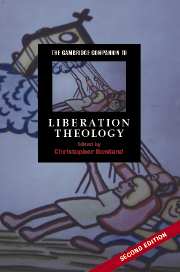Book contents
- Frontmatter
- Introduction: the theology of liberation
- Part I Contemporary Liberation Theology
- 1 The task and content of liberation theology
- 2 ‘Action is the life of all’: the praxis-based epistemology of liberation theology
- 3 Liberation theology in Asia
- 4 Black theology
- 5 Feminist theology: a critical theology of liberation
- 6 Demythologising liberation theology: reflections on power, poverty and sexuality
- Part II Aspects of Liberation Theology
- Part III Analysis and Criticism
- Epilogue: the future of liberation theology
- Select bibliography
- Index
- Series list
2 - ‘Action is the life of all’: the praxis-based epistemology ofliberation theology
from Part I - Contemporary Liberation Theology
Published online by Cambridge University Press: 28 January 2008
- Frontmatter
- Introduction: the theology of liberation
- Part I Contemporary Liberation Theology
- 1 The task and content of liberation theology
- 2 ‘Action is the life of all’: the praxis-based epistemology of liberation theology
- 3 Liberation theology in Asia
- 4 Black theology
- 5 Feminist theology: a critical theology of liberation
- 6 Demythologising liberation theology: reflections on power, poverty and sexuality
- Part II Aspects of Liberation Theology
- Part III Analysis and Criticism
- Epilogue: the future of liberation theology
- Select bibliography
- Index
- Series list
Summary
If you continue in my word then you are truly my disciples; and you will know the truth and the truth will make you free.
(John 8.31, 32)That practice, truth and freedom are inseparable is axiomatic for liberationtheology.
The defining characteristic of liberation theology is that it is a lived praxis insolidarity with the poor and oppressed. It is defined as theology, and not simplyas an ethical or pragmatic stance, in that the key question concerns the living ofa specifically Christian life, and the story of the Bible isbrought into dialogue with the story of life, the story of the world. Freedom isthe goal towards which practice is oriented. In this committed and value-ladenpractice, truth will be made manifest; the true character of the ideologicallydistorted structures of this world will be unmasked; and, for the truth ofGod’s fullness of life for all humanity, men and women will live anddie.
The commitment and practice of liberation theology requires three moments: themoment of praxis, the moment of reflection on praxis, and the moment of return toa renewed praxis. It begins and ends in praxis. Given this primacy, and the claimto a new way of doing theology founded in it, the question arises whether praxisis in itself epistemologically significant. Can we know through praxis? And if so,what can we know?
This question is significant not only for liberation theology, but for a widevariety of theologies of practice. The epistemological significance of practice isa question raised by the extensive contemporary use of the Pastoral Cycle, a modelof doing theology which begins in concrete experience and practice.
- Type
- Chapter
- Information
- The Cambridge Companion to Liberation Theology , pp. 39 - 54Publisher: Cambridge University PressPrint publication year: 2007
- 3
- Cited by

